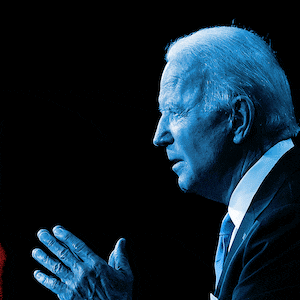President Joe Biden has reassured House Democrats that he is committed to his COVID-19 relief package in its current form and that despite his “cordial” meeting with Senate Republicans on Monday night, “the idea that we’re going to go out and compromise and go from a trillion-nine to six hundred billion is just not in the cards.”
Biden’s remarks, made on a call with House Democrats on Wednesday morning, a recording of which was obtained by The Daily Beast, is the surest indication yet that he plans to push for passage of the “American Rescue Plan,” his $1.9 trillion relief package to address the coronavirus pandemic and the damage it has done to the nation’s economy, through the budget reconciliation process. That process, which allows the Senate to pass budget-related legislation through a simple majority, would circumvent attempts by Republicans to filibuster the relief plan.
“We’ve got to be up to the moment,” Biden said on the call. “That's what the American people, I think, are expecting of us, and frankly, that’s what they have a right to expect. And that’s why I’ve asked for the package proposed.”
Biden took particular exception to the Republican proposal on direct payments to cash-strapped Americans. Under his plan, direct payments would begin at $1,400 per person, as well as for dependents, gradually phasing out for individuals with a gross income of more than $75,000. Under the Republican plan, those payments would be cut to a $1,000 maximum, phasing out for individuals who made more than $40,000 in taxable income, with a $50,000 cap.
The president said that proposal would leave out almost the entire middle class, which he called a non-starter.
“Who are we helping is just as important as who’s being left out,” Biden said on the call. “I don’t think we need to be in the business of helping those folks making three hundred grand a year, but a family making 60, 70 grand, maybe 80, who’s barely hanging on, middle-class folks?”
“We want to make sure we get the poor,” Biden continued, “but we can't leave out the middle class.”
The adjective “targeted” is most often used by the Republicans to describe a plan under which direct payments would be cut from $1,400 to $1,000 per person, phasing out for individuals who made more than $40,000 in taxable income in 2019 with a $50,000 cap. Democrats have not yet outlined an income bracket where they’d limit check eligibility, but it’s likely to be more in line with the $75,000 threshold in the CARES Act, and the administration is aiming to expand eligibility to adult dependents. Given their belief that the last round of checks worked well, many Democrats see no problem in getting more money into the economy, especially with the relatively negligible dollar difference between a “targeted” plan and what they may propose.
The president’s private assurances that slashing more than a trillion dollars from his COVID relief bill, particularly cuts in direct payments to Americans and assistance for schools to reopen their doors, “is just not in the cards” come as Democrats on Capitol Hill have been preparing to pass the relief plan with minimal Republican support.
Democrats—who owe their razor-thin majority in the Senate to victories in the Georgia runoff elections in which $2,000 stimulus checks played a key role—have already put the reconciliation process into motion. On Monday, Senate Majority Leader Chuck Schumer (D-NY) invoked the memory of the onset of the Great Recession as a moment when Congress was “too timid and constrained” in its response, a line that centrist Sen. Joe Manchin (D-W.V.) echoed on Tuesday morning.
"If it’s $1.9 trillion, so be it,” Manchin said on MSNBC’s Morning Joe, stressing that while he wants the process to be bipartisan, he won’t stand in the way of passing much-needed relief. “If it’s a little smaller than that and we find a targeted need, then that's what we're going to be. I want it to be bipartisan.”







